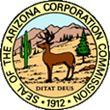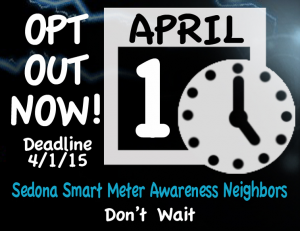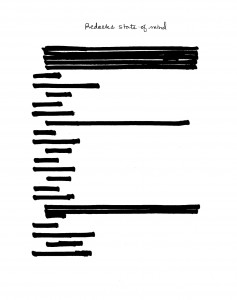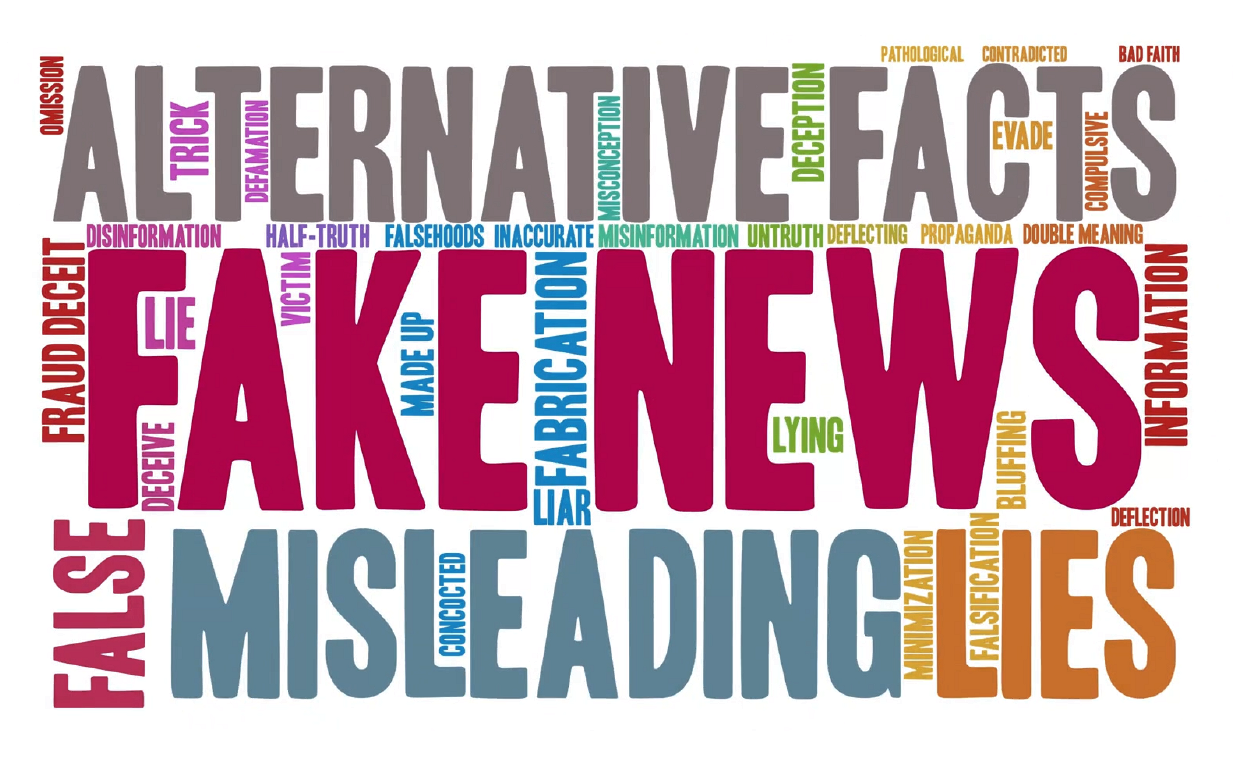ACC Violates Public Records Law
Information & Perspective by Warren Woodward
Sedona, Arizona ~ June 5, 2015

The ACC is tasked with the responsibility to protect AZ ratepayers by weighing the costs and benefits of all state utility requests.
Introduction
Last December I made a Public Records Request of the Arizona Corporation Commission (ACC) for all emails having to do with the Arizona Department of Health Services “smart” meter study. Last January the ACC provided me with 2,899 pages of emails and documents. Upon reading them, I realized the ACC had violated Public Records Law by not providing me everything they should have and also by arbitrarily redacting what they did provide.
So last March I told the ACC they had botched my request and needed to do it over completely. In the middle of last month I received the ACC’s redo.
In my request for a redo I had asked the ACC, “What are you people, criminals with something to hide?” After getting the ACC’s redo (and recently chronicling the numerous laws the ACC has violated and continues to violate, here: http://images.edocket.azcc.gov/docketpdf/0000163221.pdf ), I think the answer to that question is unfortunately Yes.
In this critique of the ACC’s redone emails I will show in detail that:
-
Almost none of the ACC’s redactions should have been made in the first place.
-
In their redo, and in order to appear transparent, the ACC has engaged in padding to make it look like the ACC unredacted more than what it really did.
-
The ACC has not provided me with all the emails that it should have.
-
The ACC acts arbitrarily, is incompetent and cannot be trusted to properly redact anything.
In the ACC’s cover letter that accompanied the redone emails, much was made of the number of documents and pages provided me in my Public Records Request, and how “portions of fewer than 100 documents were subject to redactions ….”
Those numbers are irrelevant. Typically, the ACC is attempting to obfuscate, to distract and mislead by giving those numbers. The ACC is attempting to appear thorough, responsive and transparent when in fact it has not been.
First of all the number of redactions compared to the total number of documents is irrelevant. What’s relevant is whether any of those redactions are proper or not.
Secondly, what appears to be a large number of documents and emails initially provided in my Public Records Request is not really that large since there was an incredible amount of duplication. Some email threads and documents were given two, three and four times.
Additionally, this kind of numbers game the ACC is playing is misleading. Suppose I got 100 emails and 99 of them were inconsequential but one of them, the incriminating one, was redacted. Would it make sense, then, to say to me, “We gave you 100 emails and only one was redacted?” It would only make sense if the agency saying that was trying to skirt the law because it had something to hide.
As we examine the ACC’s redone emails, incompetence as well as a pattern of deceit and willful non-compliance with Public Records Law will be obvious.
In response to my request for a redo, the ACC sent me 77 pages of emails and documents divided into 23 Parts. I will discuss each part in order. I have detailed this critique of the ACC’s redone emails to the point of providing page and Part number because this critique is a component of my complaint to the Arizona Ombudsman ( http://www.azoca.gov/ ), which is the next step after an agency fails its redo of a Public Records Request. Consequently, much of this critique is heavy on detail and somewhat tedious as a result. Readers wanting to cut to the more juicy bits are advised to skip to Part # 3, and then just read Part numbers 5, 21, 22 and the Conclusion.
 Part # 1
Part # 1
As can be seen on page 97 of Part 30 of the initial emails I got from the ACC, the email from ACC Executive Director Jodi Jerich provided in Part # 1 of the redo was never redacted in the first place. The letter (page 98, Part 30) attached to her email was however, and in full. Now that this letter is mostly unredacted, one can only wonder why it was redacted in the first place. What’s the big deal?
This is something that will be seen again and again as we review these redone emails. Words, phrases and sentences were redacted that had no business being redacted in the first place. The ACC redacts arbitrarily. The ACC cannot be trusted to properly redact. Consequently, I want to see the remaining redacted bits of Jerich’s letter as well as everything else that’s still redacted.
Part # 2
This particular batch of six emails starts on page 39, Part 22, of the initial emails. Of those six emails, only one line in the first email was redacted. So the ACC is engaging in padding by providing me with five additional emails that were never redacted in the first place.
There’s another point here that needs to be made. It seems like almost any email to or from anyone in the ACC’s Legal Division automatically got redacted for “attorney/client privilege” or “attorney/client communication.” As proof, note that this same thread of five emails was also sent to ACC commissioner Smith, but in that thread (which can be seen starting on page 43 of Part 21) the one line message from Jerich was not redacted.
Jerich to Smith: “Here is the email string with DHS on the smart meter study issue.”
Jerich to Janice Alward in ACC Legal, redacted initially for “attorney/client communication” but then unredacted in the ACC’s redo: “Here is my email string with DHS regarding a study on the levels of radio frequency emissions from smart meters.”
That sort of redaction is total arbitrary nonsense. Why was it ever redacted in the first place? Because it was going to Legal?

Due to public outcry, APS has extended its opt out deadline. Opt out now! Contact Sedona Smart Meter Awareness today by clicking on this ad.
Part # 3
The four emails and one document that comprise Part # 3 of the redo are found on pages 19 through 25 in Part 22 of the initial emails.
Part # 3 is a very failed, incompetent attempt by the ACC to hide the fact that the heavily redacted document provided in Part # 3 is a draft Memorandum of Understanding (MOU) between the ACC and the ADHS.
The four emails that accompany the draft MOU were heavily redacted initially and are still heavily redacted in the redo. Initially, even the subject heading of the emails was censored. It seemed the ACC was, and still is, determined to hide the fact that there was a draft MOU between it and the ADHS. Key items are still blacked out giving every appearance of dishonesty, of subterfuge on the part of the ACC.
The draft Memorandum of Understanding (MOU) reproduced on pages 2 through 7 of the Part 3 redos is a curious piece of redaction and unredaction. In the attempt to hide the fact that it is a draft MOU between the ACC and the Arizona Department of Health Services (ADHS), the words, “Department of Health Services,” are thoroughly blacked out in the document’s title.
What the ACC is too stupid to realize is that in the initial redaction of this MOU, the marking pen used to censor the document was dry and one can see through the attempted censorship clearly enough to read “Arizona Department of Health Services” in the document’s title.
Just as stupidly, the initials, ADHS, are blacked out throughout the redone version until we come to the Purpose section where we find:
Purpose. The purpose of this MOU is to establish the terms and conditions under which the ADHS will conduct its study on behalf of the ACC concerning the potential health impacts related to [redacted] Electronic Meters. The end product of this MOU is a final report by the ADHS to assist the ACC in its determinations as to whether the use of [redacted] Electronic Meters by Arizona Utilities is safe in terms of public health.
So, did someone forget to redact “ADHS” in the Purpose section? If not, what was the reason for redacting it throughout the MOU up to that point?
A little further into the redone draft MOU, we see a section titled Responsibilities of ACC. The next section is entitled Responsibilities of [redacted]. Given the size of the redaction which is about as long as the letters, ADHS, and given the context which obviously, from the Purpose section, is a MOU between the ACC and the ADHS, one does not have to be a genius detective to realize the redaction is “ADHS,” and that this section is actually Responsibilities of ADHS. So who does the ACC think they are fooling? What is the point of this nonsense?
Also, in the initial, fully redacted version of the draft MOU, because of the dry marking pen it is very easy to see that what was written was in fact Responsibilities of ADHS.
People who cheat like this are usually not very intelligent. They are unintelligent for trying to cheat in the first place, and they get caught because they aren’t nearly as clever as they think they are. They are too slow-witted to know they are unintelligent. So they make stupid mistakes and they get caught. What is occurring throughout these redone emails, indeed what has occurred at the ACC throughout the entire “smart” meter fiasco, is the epic failure of the witless.
By the way, the fact that there was a draft MOU but never a completed, signed MOU between the ACC and the ADHS is very relevant to my ACC appeals and the entire “smart” meter issue. Being able to see the draft MOU, completely unredacted, is therefore essential. It is clear from the emails I received initially that the ACC had undue influence on, and involvement in, the ADHS study before and during its making. Indeed, a meeting with individuals from the ACC and the ADHS was held just before the study’s release so the ACC could, according to the ADHS, “see if it covered the questions asked.” (p. 2, here: http://images.edocket.azcc.gov/docketpdf/0000158555.pdf ).
But because there was no formal MOU between the ACC and the ADHS, no one really knows what questions were asked in the first place. In order to get answers, the right questions have to be asked first, not later. It’s backwards, totally improper and unethical for the ADHS to do a study then go to the people who commissioned the study and say essentially, “Is this what you wanted?” How would the ACC know if the study covered the questions asked, unless they knew what answers they wanted in the first place?
Part # 4
Part # 4 is just more padding. The first two emails in Part # 4 were never redacted to begin with (see page 12, Part 22, initial emails), and the remaining three emails were already included in Part # 3.
Part # 5
These six emails are found on pages 52 and 53 in Part 31 of the initial emails, and they were almost completely redacted. In their redone version they are still mostly redacted. A few benign phrases here and there have been been revealed. One wonders why the newly revealed phrases were ever redacted in the first place.
That said, my curiosity is teased by one newly revealed phrase written by ACC attorney Maureen Scott which follows several lines of solid redaction: “A least that is what Brad Carroll told me the other day in a conversation.”
I, and the Arizona public, have a right to know just what Brad Carroll, the lawyer for “smart” meter boosters Sulphur Springs Valley Electric Cooperative, told ACC attorney Maureen Scott and what she found important enough to share via email with ACC utility engineers Ed Stoneburg, Del Smith, and Margaret Little as well as ACC Utility Division Director Steven Olea and ACC lawyer Brian Smith (who was censured for an ethics violation in 2002).
If it was important enough to share with them then it should be important enough to share with the Arizona public.
Part # 6
More padding and a total waste of time. Part # 6 contains the same emails that were in Part # 5, except for the first email which was never redacted anyway (as can be seen on page 64, Part 31 of the initial emails).
Part # 7
Part # 7 is padded out with four of the five emails that were in Part # 6 but it also includes four other emails and a draft Data Request (DR) letter.
The second email and draft DR letter are the only things newly revealed in redo Part # 7.
“Toby here are some suggested edits from Brian. Please let Karyn know if they are okay. Thanks.” Why was that ever redacted in the first place? How many other emails have been redacted simply because they were written by an ACC lawyer? The ACC needs to come clean and unredact everything.
The draft DR letter is the same. In the initial emails (page 72, Part 31) it is completely redacted. Reading it completely unredacted one can only wonder why it was redacted in the first place. It also causes one to wonder what else is still redacted that never should have been.
Part # 8
The padding party continues as Part # 8 repeats the email threads of Parts # 5, 6, 7 while adding three emails at the beginning. Comparing those three emails with their initial versions on page 52 of Part 31, very little has been unredacted. More time wasted as the ACC feigns transparency.
Part # 9
The one email presented in this Part has exactly the same redactions as it did on page 75, Part 22 of the initial emails. So what is it doing here? Did the ACC think I wouldn’t notice that? What?
The draft Memorandum Of Understanding (MOU) between the ACC and the ADHS that follows the email is somewhat unredacted compared to the initial one (which was completely redacted, page 76, Part 22), but it is redacted in the same curious fashion as the one previously discussed in the section on Part # 3, above. “Department of Health Services” is blacked out from the document’s title but mentioned enough throughout that it is quite obviously a draft MOU between the ACC and the ADHS.
One thing different from the Part # 3 MOU is that this time somebody forgot to redact “ADHS” from “Responsibilities of ADHS”. Just what might those “Responsibilities” have been? Arizonans have a right to know. Why is the ACC hiding them?
 Part # 10
Part # 10
These three emails appear on page 91 of Part 22 of the initial emails. There they were almost completely redacted. Even the subject headings were redacted. Looking at the partially redacted redone versions, why these emails were redacted in the first place makes no sense. They need to be fully disclosed at once.
The MOU between the ACC and the Arizona Radiation Regulatory Agency (ARRA) that was on page 84 of Part 22 of the initial emails was completely blacked out initially. Now the redone version is mostly unredacted. Reading it, one can only ask why this MOU was redacted in the first place. But the ACC still needs to unredact the short phrase in the Responsibilities of ACC section. Again, what is the ACC hiding and why?
Part # 11
The one email in this Part is just another example of the ACC’s absurd and arbitrary redacting.
In the redo version of this one line email between ACC Legal’s Maureen Scott and ACC utility engineer Ed Stoneburg, we can now see that what was initially censored was, “I am going to start checking out some other options.”
They were discussing a Protective Agreement for the utilities involved in the ADHS study. For utilities to give out customer info (such as their names and addresses) to ADHS study workers involved in measuring “smart” meter radiation, it could be a violation of customer confidentiality rules so a Protective Agreement was needed. The fact that Scott was “going to start checking out some other options” is hardly something worthy of “attorney/client privilege” redaction.
Part # 12
The two emails presented in Part # 12 can be found on page 28 of Part 18 of the initial emails. The first email was never redacted, so once again, more padding by the ACC. The second email was heavily redacted and is now completely unredacted in Part # 12. Once again, one wonders why the information was ever considered worthy of redaction for “attorney/client communication.” When I see stuff like this I wonder about anything else still redacted for “attorney/client communication.” The ACC has proved that they cannot be trusted to redact anything.
Part # 13
Part # 13 is another example of ACC padding and gratuitous redacting. As can be seen on pages 24 to 27 in Part 18 of the initial emails, the first six emails in Part # 13 were never redacted in the initial emails, and the remaining five emails that were redacted for “attorney/client communication” should have never been redacted in the first place. As I mentioned above, such redactions only call into question the ACC’s ability to redact properly and the validity of anything still redacted.
Part # 14
Part # 14 is more of the same abuse of “attorney/client privilege.” As can be seen by comparing the redo with the initial email (page 57, Part 6), here’s what was initially blacked out: “if this looks okay to you. I will forward it to Jerry.”
The letter to Jerry (Perkins of the Arizona Radiation Regulatory Agency) that follows, which was almost entirely redacted initially, proves to have been gratuitously redacted on comparison with the unredacted version. Once again, such redactions only call into question the ACC’s ability to redact and the validity of anything that is still redacted.
Part # 15
The one email in Part # 15 (which is found in four different places in the initial emails) has only been partially unredacted. As usual, what was redacted initially was gratuitous. The whole email needs to be revealed.
The draft MOU that comprises the rest of Part # 15 has been completely unredacted which is how it should have been presented in the first place.
(The initial email is found page 70, Part 6; page 34, Part 21, and on pages 25 and 35, Part 32. The fully redacted MOU is found on pages 21 and 36, Part 32.)
Part # 16
The one unredacted email in Part # 16 is yet another example of why the ACC cannot be trusted with a censor’s marking pen. Compared with the redacted original on page 34 of Part 32 of the initial emails, we learn that ACC Legal’s Maureen Scott “ … was elated to see that Jerry had signed the Letter Agreement,” and that she asked ACC utility engineer Ed Stoneburg “Did we receive Don Herrington’s yet?” Why was this initially censored in my Pubic Records Request? Because it involved an ACC lawyer?
Part # 17
More nonsense. This one unredacted email in Part # 17 from ACC Legal’s Maureen Scott to ACC utility engineer Ed Stoneburg reveals that the subject of the email was “We got Don’s Letter Agreement back as well,” and that the blacked out text was “So we are all set.” Was that really worthy of “attorney/client privilege” redaction?
Part # 18
Part # 18 is more abuse of “attorney/client privilege” with some padding thrown in. The five page draft MOU included in this Part # 18 was never redacted in the initial emails anyway, so what’s it doing here other than taking up space and wasting my time? Was I meant to feel like the ACC was complying with Public Records Law when I saw it?
The first email in the Part # 18 redo was never redacted so I don’t know what it’s doing here either. In the second email in Part # 18 we learn that ACC Legal’s Janice Alward told ACC Executive Director Jodi Jerich and ACC utility engineer Ed Stoneburg, “this is the version to send on to ARRA.” The redacted email can be seen on page 90, Part 21 of the initial emails. It is also found on page 12, Part 27 of the initial emails where, unlike on page 90, Part 21, the email subject heading was also redacted. Such is the incompetent, arbitrary nature of ACC redactions.
Part # 19
More padding. More nonsensical abuse of “attorney/client privilege.”
The first lengthy email in Part # 19 was never redacted. So again, what’s it doing there other than taking up space and wasting my time?
The second email should have never been redacted for “attorney/client privilege.” Is the following really privileged information?
“here are the changes in red-lined format. I did not include all the numbering changes. Please let me know if you need anything else.”
(Initial, redacted version can be seen on page 62 of Part 10 of the initial emails.)
Part # 20
The first email in Part # 20 was never redacted. The second email presented was unredacted already in Part # 19 (see above).
The big deal here is the inclusion and unredaction of a MOU which was previously completely redacted. Again, after reading it one wonders why it was ever redacted in the first place. (The initial, redacted version can be seen on page 56, of Part 10 of the initial emails.)
Part # 21
Yet more padding. Of the five emails presented in Part # 21, only one of them was redacted in the first place. That initial, redacted version can be seen both on page 70 of Part 18 and on page 27 of Part 21 of the initial emails.
While “attorney/client communication” was claimed, “incriminating as all get out” was probably the real reason this email along with its subject heading was initially redacted.
With the subject heading “Review Draft DHS Smart Meter Report,” ACC Executive Director Jodi Jerich took the incredibly unethical step of inviting email recipients ACC Utility Division Director Steven Olea, ACC utility engineers Ed Stoneburg and Margaret Little, as well as ACC Legal Division attorney Maureen Scott to a meeting with ADHS personnel in order to review the ADHS “smart” meter study before its release.
Jerich wrote: “This is an opportunity for us to look at the DHS report before it is sent over to the ACC.”
While I give the ACC some credit for finally revealing this information, I have to say it was obvious from the rest of the emails in the thread. And it’s the sort of transparency one should expect in a Public Records Request anyway.
Part # 22
Not only did the ACC unethically meet with the ADHS to review their “smart” meter study (as mentioned above in Part # 21), the ADHS actually sent the ACC the final draft before the study was released. These 8 emails in Part # 22 are about that. But only one of the eight emails was redacted in the first place so the other seven are just taking up space.
It is likely that, in its overall incompetence, the ACC thought that two, not one, of the emails were redacted since that is how this thread appears starting on page 75 of Part 20 of the initial emails.
However, on page 113 of Part 25 of the initial emails where this email thread also appears, someone at the ACC neglected to redact the second email even though there is a handwritten note next to it that says “redact: atty/client” with an arrow pointing to it, it being ACC Executive Director Jodi Jerich’s words to ACC Utilities Division Director Steven Olea, ACC Legal Division Director Janice Alward, ACC attorney Maureen Scott, and ACC utility engineers Ed Stoneburg, Jeff Francis and Margaret Little. “Here is the DHS Final Report. Please review.” never got redacted as planned.
ACC utility engineer Jeff Francis’ reply one hour and eight minutes later was initially redacted completely. Now, as it feigns transparency, the ACC has allowed us to see this much of Francis’ reply: “I read it through and carefully – only found a couple of very minor typos, otherwise the report is” – and the rest of what Francis wrote is redacted. We need to be able to see what else Francis had to say. The rest of his sentence must be revealed.
Part # 23
Part # 23 is just more padding. With the exception of ACC utility engineer Jeff Francis’s email which was already dealt with above in Part # 22, none of these four emails (which appear on page 113 of Part 25 of the initial emails) were redacted in the first place.
 Conclusion
Conclusion
In addition to the emails and documents discussed above that are still in need of full disclosure, there are others the ACC did not address at all in their pitifully inadequate redo. For example, most if not all of the emails involving former ACC commissioner Brenda Burns were fully redacted for the reason of “state of mind.” I don’t know if the ACC Legal Division was making a statement about Brenda’s metal health or what.
In any case, with “state of mind,” it appears that the creative ACC Legal Division has invented a new category for redaction. Lawyers I talked to, including one at the state Attorney General’s office, had never heard of such a thing. An Arizona newspaper reporter who covers the utilities and the ACC told me he’d made many Public Records Requests and had never seen anything redacted for “state of mind.” So I must be special. In the first Public Records Request I ever made in my life it looks like the ACC invented a whole new classification.
In July of 2013, Smith was busy writing 12 pages of “his portion” of a “smart meter memorandum.” Who was writing other portions is unknown to me at this time. I have not found any other emails about it.
Smith’s emails and drafts stretch from page 26 to 68 in Part 22 of the emails the ACC initially provided me. Because parts of his emails are unredacted, and also because the ACC did another sloppy job with the marking pen, it seems Smith was compiling and summarizing information that had been sent in to the ACC “smart” meter dockets. In one of Smith’s drafts I was able to make out my name and references to stuff I had docketed as well as references to various state and federal agencies that had weighed in on the “smart” meter issue.
It would be interesting to know what conclusions Smith came to or what recommendations he may have made. His memorandum came around the same time ACC Executive Director Jodi Jerich (who is implicated in the ACC corruption scandal currently under investigation by the Arizona A.G. office) was inquiring of the ADHS about the possibility of ADHS performing a “smart” meter health study for the ACC. The ACC commissioners voted to have ADHS conduct the study the following month on August 5th, 2013.
But the emails between Jerich and (then) ADHS Director Will Humble that discussed the possibility of an ADHS study were ones I never got from the ACC even though I should have. I suspect they were withheld because the emails made neither Jerich nor Humble look good.
At the same time I made a Public Records Request of the ACC, I also made one of the ADHS. The Jerich/Humble email exchange appeared in the emails I got from the ADHS but not in the ones I got from the ACC. That point was made in my redo request to the ACC, yet incredibly, the ACC chose not to include the missing emails once again. And once again, you can’t make this stuff up! (But you can read about it on pages 4 & 15, here: http://images.edocket.azcc.gov/docketpdf/0000162532.pdf )
Public Records Requests seem to depend on trust. One has to trust that the agency to which the request is made will comply. I learned long ago I could not trust the ACC. The ACC’s non-compliance with Public Records Law is just one of many examples of its incorrigible lawlessness, of its serial dishonesty.
With the “smart” meter issue in general, the ACC is caught in a quicksand of lies and lawlessness. Each lie told leads to another lie told, and each law broken leads to another law broken. The ACC will likely drown in this quicksand of its own making. However, producing all the emails and documents I initially requested – and unredacted – might be a first and baby step out of the quagmire.

Read www.SedonaEye.com for daily news and interactive views!

 Part # 1
Part # 1
 Part # 10
Part # 10 Conclusion
Conclusion


Excellent research results. Isn’t it interesting how ACC tried to obfuscate there was every anything in writing to support its request of ADHS to perform a health study to see if there were health effects from smart meter wireless emissions? Sedona Smart Meter Awareness asked repeatedly for this document, but even more appalling was that infamous August 5, 2013 meeting that some of us listened to in real time. We asked for a transcript of the meeting and were told there was none, but lo’ and behold one magically appeared in December, 2014 to Commissioner Brenda Burns as she mentioned it during that meeting. I’m sure now that that loud banging we heard during that meeting, instead of the ACC Commissioners’ conversation, must have been intentional – like the redaction in the emails.
I’m ashamed to admit I voted some of these nefarious characters on to the Commission. If only moral and ethical people would run for office we wouldn’t have to spin our wheels and could find real solutions to what we face.
“Everything the CPUC has Done Should be Re-Opened”
Very important video that exposes what is going on in California. No doubt about it, similar things are happening with the State of Arizona’s Corporation Commission.
https://www.youtube.com/watch?feature=player_embedded&v=i8k4CS54aHs